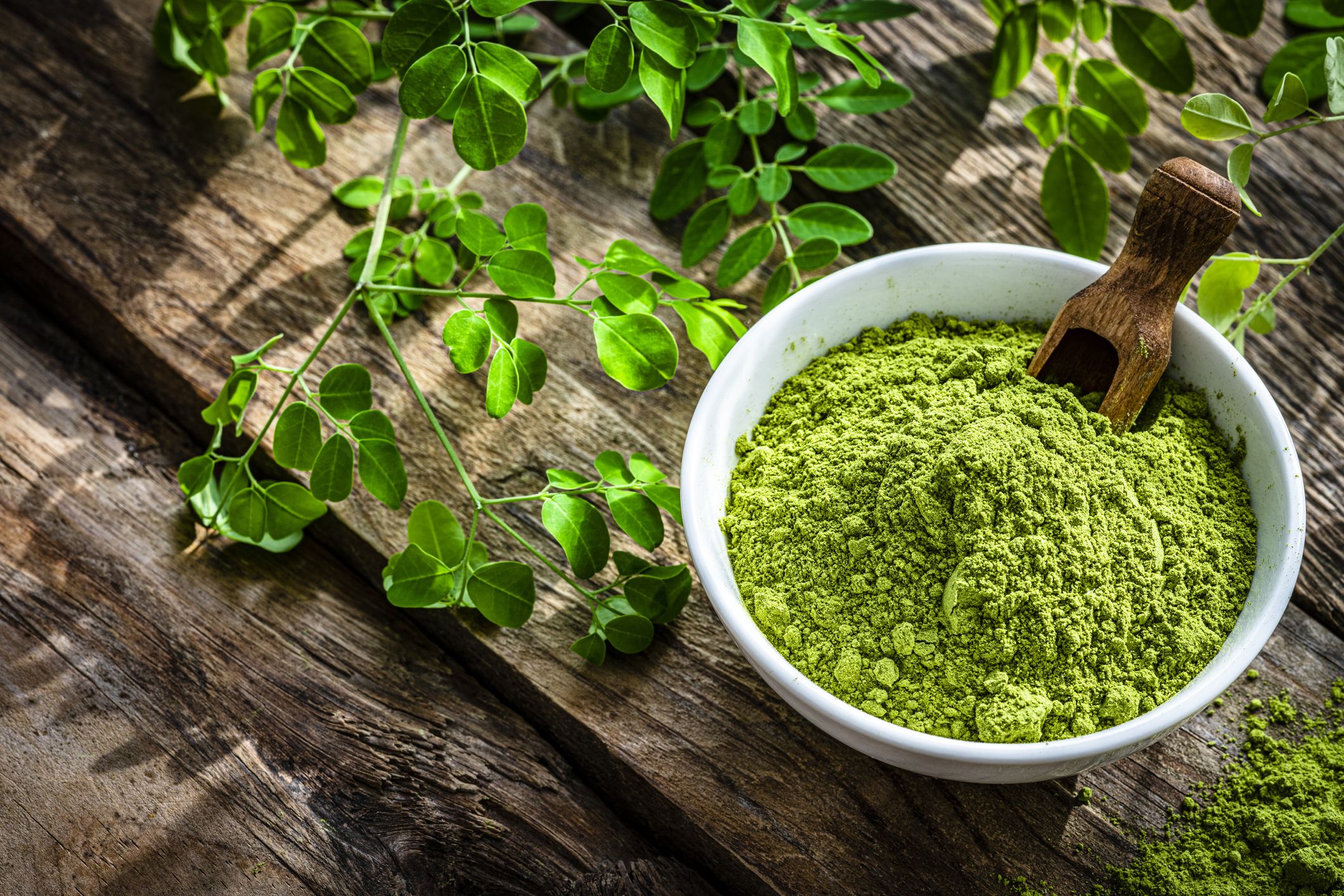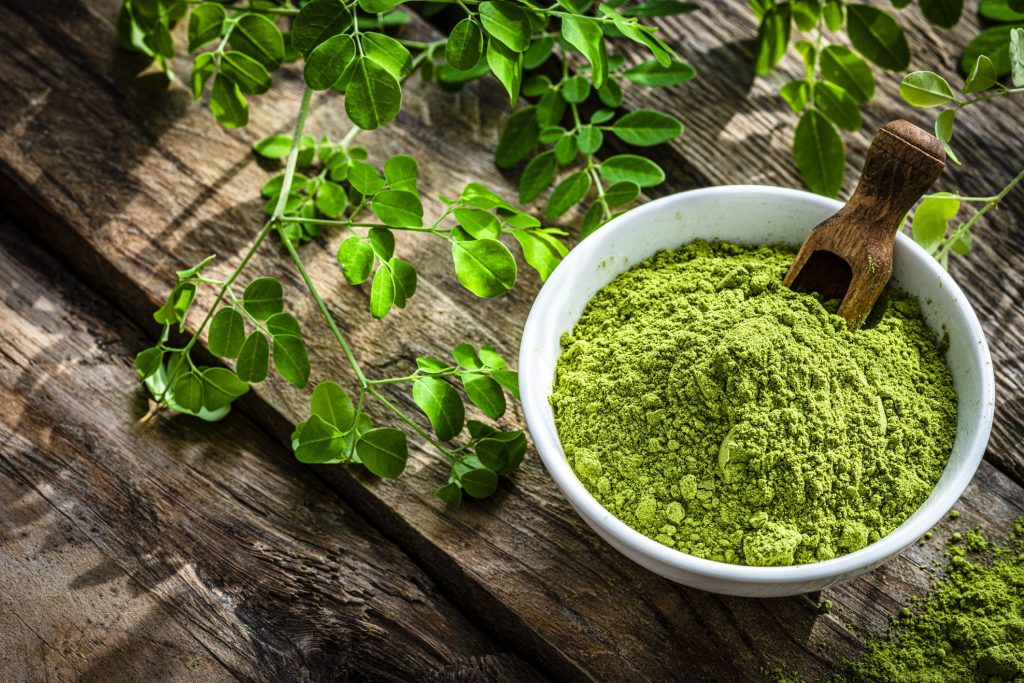Now Reading: Moringa Leaves Benefits: 15 Amazing Ways to Improve Your Health and Wellness
- 01
Moringa Leaves Benefits: 15 Amazing Ways to Improve Your Health and Wellness
Moringa Leaves Benefits: 15 Amazing Ways to Improve Your Health and Wellness

Moringa Leaves Benefits: Discover 15 amazing ways how moringa can improve your health and wellness, from skin and hair to brain and bones.
Moringa is a plant that has been used for centuries for its medicinal and nutritional properties. It is also known as the drumstick tree, the miracle tree, the ben oil tree, or the horseradish tree. Moringa grows in tropical and subtropical regions of Asia, Africa, and Latin America. It can survive in harsh conditions and produce edible leaves and pods throughout the year.
Moringa leaves are rich in many essential nutrients, such as vitamins, minerals, antioxidants, and amino acids. They can be eaten fresh, cooked, or dried and powdered. Moringa leaves can also be used to make tea, oil, or extracts. Moringa seeds, flowers, roots, and bark are also edible and have various health benefits.
In this article, we will explore 15 possible benefits of moringa, as well as its side effects and risks. We will also provide some tips on how to use moringa and where to buy it.
Table of Contents
1. Moringa Leaves Benefits: It protect and nourish the skin and hair
Moringa has many properties that can benefit the skin and hair. For example:
- Moringa oil is rich in fatty acids and antioxidants that can moisturize, nourish, and protect the skin from environmental damage.
- Moringa oil may also help heal wounds, reduce scars, and prevent infections.
- Moringa oil may improve hair health by strengthening the hair follicles, reducing hair loss, and preventing dandruff.
- Moringa leaves contain vitamin A, which is essential for healthy skin and vision.
- Moringa leaves also contain vitamin C, which can boost collagen production and reduce inflammation in the skin.
- Moringa leaves have antibacterial and antifungal properties that can prevent acne, fungal infections, and other skin problems.
2. Moringa may treat edema
Edema is a condition where fluid accumulates in the tissues of the body, causing swelling and pain. It can be caused by various factors, such as injury, infection, kidney disease, heart failure, or pregnancy.
Moringa has anti-inflammatory properties that can help reduce edema. According to a study on mice with ear edema, moringa seed oil was able to reduce the swelling and inflammation by inhibiting the production of inflammatory molecules7. Another study on rats with paw edema found that moringa leaf extract had a similar effect8.
These results suggest that moringa may be useful for treating edema in humans, but more research is needed to confirm its safety and efficacy.
3. Moringa Leaves Benefits: How Moringa May Protect the Liver
The liver is an organ that performs many vital functions in the body, such as detoxifying the blood, producing bile, regulating hormones, and storing energy. However, the liver can be damaged by various factors, such as alcohol consumption, drug abuse, viral infections, or obesity.
Moringa leaves benefits may include protecting the liver from damage by enhancing its antioxidant capacity and reducing oxidative stress. Oxidative stress is a condition where there is an imbalance between free radicals (unstable molecules that can damage cells) and antioxidants (molecules that can neutralize free radicals).
A study on guinea pigs with high cholesterol levels found that moringa leaves reduced the oxidative stress in the liver and improved its function. Another study on rats with liver injury induced by acetaminophen (a common painkiller) found that moringa leaf extract prevented the liver damage by increasing the levels of glutathione (an important antioxidant) and reducing the levels of alanine aminotransferase (an enzyme that indicates liver damage).
These findings indicate that moringa leaves benefits may have hepatoprotective effects (protecting the liver from harm), but more human studies are needed to verify its safety and dosage.
4. Moringa may prevent and treat cancer
Cancer is a disease where abnormal cells grow uncontrollably and invade other tissues of the body. It can affect any organ or system of the body and cause various symptoms and complications.
Moringa has anti-cancer properties that may help prevent or treat cancer by:
- Inducing apoptosis (programmed cell death) in cancer cells.
- Inhibiting angiogenesis (the formation of new blood vessels that feed cancer cells).
- Enhancing the immune system’s ability to fight cancer cells.
- Sensitizing cancer cells to chemotherapy drugs.
Some of the compounds in moringa that have shown anti-cancer activity include:
- Niazimicin: a compound that inhibits the growth of leukemia cells.
- Benzyl isothiocyanate: a compound that suppresses the development of colon cancer cells.
- Kaempferol: a flavonoid that induces apoptosis in ovarian cancer cells.
- Quercetin: a flavonoid that inhibits angiogenesis in breast cancer cells.
However, most of the studies on moringa and cancer have been done in test tubes or animals, and the results may not apply to humans. More clinical trials are needed to determine the safety, efficacy, and optimal dosage of moringa for cancer prevention or treatment.
5. Moringa may treat stomach disorders
Moringa Leaves Benefits includes it may help treat some stomach disorders, such as:
- Constipation: Moringa leaves have a laxative effect, which can help relieve constipation and improve bowel movements.
- Peptic ulcers: Moringa leaves can reduce the acidity of the stomach and protect the gastric mucosa (the lining of the stomach) from ulceration.
- Diarrhea: Moringa leaves have antibacterial and antispasmodic properties, which can help prevent or treat diarrhea caused by bacterial infections or irritable bowel syndrome.
- Colitis: Moringa leaves have anti-inflammatory and antioxidant properties, which can help reduce the inflammation and oxidative damage in the colon caused by ulcerative colitis (a type of inflammatory bowel disease).
Moringa Leaves Benefits, may also improve digestive health by:
- Promoting the growth of beneficial bacteria in the gut.
- Enhancing the absorption of nutrients from food.
- Preventing intestinal worms and parasites.
6. Moringa Leaves Benefits: How Moringa May Lower Blood Sugar Levels
High blood sugar levels (hyperglycemia) can lead to various health problems, such as diabetes, cardiovascular disease, nerve damage, kidney damage, and eye damage. Therefore, it is important to keep blood sugar levels within a normal range.
Moringa leaves benefits may include lowering blood sugar levels by:
- Stimulating the secretion of insulin (a hormone that regulates blood sugar levels) from the pancreas.
- Increasing the sensitivity of cells to insulin (which allows them to take up glucose from the blood more efficiently).
- Inhibiting the activity of alpha-glucosidase (an enzyme that breaks down carbohydrates into glucose).
- Reducing the absorption of glucose from the intestines.
Several studies have shown that moringa leaves or extracts can lower blood sugar levels in people with diabetes or prediabetes. For example:
- A study on 30 women with type 2 diabetes found that taking 7 grams of moringa leaf powder daily for 3 months reduced their fasting blood sugar levels by 13.5%.
- A study on 40 people with type 2 diabetes found that taking 50 grams of moringa leaf powder with a meal reduced their postprandial blood sugar levels (the levels after eating) by 21%.
- A study on 90 people with prediabetes found that taking 8 grams of moringa leaf powder daily for 40 days reduced their fasting blood sugar levels by 9.3% and their postprandial blood sugar levels by 12.4%.
However, some studies have reported no significant effect of moringa on blood sugar levels . Therefore, more research is needed to confirm the optimal dose and duration of moringa for lowering blood sugar levels.
7. Moringa may lower blood pressure
High blood pressure (hypertension) is a condition where the force of blood against the walls of the arteries is too high. It can increase the risk of heart attack, stroke, kidney failure, and other complications.
Moringa Leaves Benefits, may help lower blood pressure by:
- Relaxing the blood vessels and improving blood flow.
- Reducing oxidative stress and inflammation in the cardiovascular system.
- Balancing the electrolytes (minerals that regulate fluid balance) in the body.
Some studies have shown that moringa leaves or extracts can lower blood pressure in people with hypertension. For example:
- A study on 40 people with mild to moderate hypertension found that taking 4 grams of moringa leaf powder daily for 40 days reduced their systolic blood pressure (the top number) by 11.7% and their diastolic blood pressure (the bottom number) by 10.7%.
- A study on 30 people with hypertension found that taking 100 milliliters of moringa leaf juice daily for 8 weeks reduced their systolic blood pressure by 8.3% and their diastolic blood pressure by 7.1%.
However, some studies have reported no significant effect of moringa on blood pressure . Therefore, more research is needed to confirm the optimal dose and duration of moringa for lowering blood pressure.
8. Moringa may lower cholesterol levels
High cholesterol levels (hypercholesterolemia) can lead to the buildup of plaque in the arteries, which can narrow or block them and cause atherosclerosis (hardening of the arteries). This can increase the risk of heart disease, stroke, and other complications.
Moringa may help lower cholesterol levels by:
- Inhibiting the production of cholesterol in the liver.
- Increasing the excretion of cholesterol in the bile.
- Enhancing the activity of lipoprotein lipase (an enzyme that breaks down fat in the blood).
- Reducing the oxidation of low-density lipoprotein (LDL, or bad cholesterol).
Some studies have shown that moringa leaves or extracts can lower cholesterol levels in animals and humans. For example:
- A study on rabbits with high cholesterol levels found that feeding them moringa leaves for 12 weeks reduced their total cholesterol, LDL cholesterol, and triglycerides (another type of fat in the blood) by 50%, 86%, and 68%, respectively.
- A study on 30 people with high cholesterol levels found that taking 7 grams of moringa leaf powder daily for 3 months reduced their total cholesterol, LDL cholesterol, and triglycerides by 14%, 29%, and 41%, respectively.
However, some studies have reported no significant effect of moringa on cholesterol levels . Therefore, more research is needed to confirm the optimal dose and duration of moringa for lowering cholesterol levels.
9. Moringa Leaves Benefits: It may boost immunity
The immune system is a complex network of cells, tissues, and organs that protect the body from foreign invaders, such as bacteria, viruses, fungi, and parasites. It also helps eliminate abnormal cells, such as cancer cells.
Moringa Leaves Benefits may help boost immunity by:
- Increasing the production and activity of white blood cells (the cells that fight infections).
- Stimulating the production and secretion of antibodies (the proteins that bind to and neutralize foreign substances).
- Enhancing the function of macrophages (the cells that engulf and destroy foreign particles).
- Modulating the cytokine response (the signals that regulate inflammation and immunity).
Some studies have shown that moringa leaves or extracts can boost immunity in animals and humans. For example:
- A study on mice with immunosuppression (reduced immune function) induced by cyclophosphamide (a chemotherapy drug) found that moringa leaf extract increased their white blood cell count, antibody level, and macrophage activity.
- A study on 30 HIV-positive people found that taking 10 grams of moringa leaf powder daily for 3 months increased their CD4+ T cell count (a type of white blood cell that is crucial for immunity) by 20%.
However, some studies have reported no significant effect of moringa on immunity . Therefore, more research is needed to confirm the optimal dose and duration of moringa for boosting immunity.
10. Moringa Leaves Benefits: It may improve brain health
The brain is the organ that controls all the functions of the body and mind. It is composed of billions of neurons (nerve cells) that communicate with each other through chemical and electrical signals.
Moringa Leaves Benefits may help improve brain health by:
- Providing essential nutrients for brain development and function, such as vitamin E, iron, zinc, magnesium, and omega-3 fatty acids.
- Protecting the brain from oxidative stress and inflammation, which can damage the neurons and impair their function.
- Enhancing the neurotransmission (the communication between neurons) by increasing the levels of neurotransmitters (the chemicals that carry the signals), such as dopamine, serotonin, acetylcholine, and norepinephrine.
- Improving the blood flow to the brain by dilating the blood vessels and preventing blood clots.
Some studies have shown that moringa leaves or extracts can improve brain health in animals and humans. For example:
- A study on rats with Alzheimer’s disease (a degenerative brain disorder) found that moringa leaf extract improved their memory and learning abilities by reducing the accumulation of amyloid-beta plaques (the abnormal protein deposits that impair neuronal function) in their brains.
- A study on 60 elderly people with mild cognitive impairment (a decline in memory and thinking skills) found that taking 900 milligrams of moringa leaf extract daily for 3 months improved their attention, memory, executive function, and mood.
However, some studies have reported no significant effect of moringa on brain health . Therefore, more research is needed to confirm the optimal dose and duration of moringa for improving brain health.
11. Moringa Leaves Benefits: It may support bone health
The bones are the rigid structures that form the skeleton of the body. They provide support, protection, movement, storage, and blood cell production. The bones are constantly being remodeled by two types of cells: osteoblasts (the cells that build bone) and osteoclasts (the cells that break down bone).
Moringa Leaves Benefits may help support bone health by:
- Providing essential nutrients for bone formation and maintenance, such as calcium, phosphorus, magnesium, and vitamin K.
- Preventing bone loss by inhibiting the activity of osteoclasts and stimulating the activity of osteoblasts.
- Reducing the risk of fractures by improving the bone mineral density (the amount of minerals in the bones) and the bone quality (the structure and strength of the bones).
Some studies have shown that moringa leaves or extracts can support bone health in animals and humans. For example:
- A study on rats with osteoporosis (a condition where the bones become weak and brittle) found that moringa leaf extract prevented the bone loss and improved the bone mineral density and quality by modulating the expression of genes involved in bone metabolism.
- A study on 60 postmenopausal women with low bone mineral density found that taking 1.5 grams of moringa leaf powder daily for 12 weeks increased their bone mineral density by 4.3% and their serum calcium level by 9.5%.
However, some studies have reported no significant effect of moringa on bone health . Therefore, more research is needed to confirm the optimal dose and duration of moringa for supporting bone health.
12. Moringa Leaves Benefits: It may promote weight loss
Obesity is a condition where excess body fat accumulates and causes various health problems, such as diabetes, heart disease, stroke, and cancer. It is usually caused by a combination of genetic, environmental, behavioral, and hormonal factors.
Moringa Leaves Benefits may help promote weight loss by:
- Suppressing the appetite and reducing the food intake by increasing the levels of leptin (a hormone that signals satiety) and decreasing the levels of ghrelin (a hormone that stimulates hunger).
- Enhancing the metabolism and energy expenditure by increasing the thermogenesis (the production of heat) and the oxidation of fat.
- Improving the insulin sensitivity and glucose tolerance by regulating the blood sugar levels and preventing the storage of excess glucose as fat.
- Reducing the inflammation and oxidative stress in the adipose tissue (the tissue that stores fat) by modulating the expression of genes involved in fat metabolism.
Some studies have shown that moringa leaves or extracts can promote weight loss in animals and humans. For example:
- A study on mice with obesity induced by a high-fat diet found that moringa leaf extract reduced their body weight, body fat percentage, food intake, blood glucose level, serum insulin level, serum leptin level, and liver lipid level.
- A study on 41 obese people found that taking 900 milligrams of moringa leaf extract daily for 3 months reduced their body weight, body mass index (BMI), waist circumference, hip circumference, waist-to-hip ratio, body fat percentage, visceral fat area (the fat around the organs), subcutaneous fat area (the fat under the skin), serum glucose level, serum insulin level, serum leptin level, and serum adiponectin level (a hormone that regulates fat metabolism).
However, some studies have reported no significant effect of moringa on weight loss . Therefore, more research is needed to confirm the optimal dose and duration of moringa for promoting weight loss.
13. Moringa may prevent or treat anemia
Anemia is a condition where the number or quality of red blood cells (the cells that carry oxygen) is low. It can cause symptoms such as fatigue, weakness, pale skin, shortness of breath, dizziness, and headache. It can be caused by various factors, such as blood loss, iron deficiency, vitamin B12 deficiency, folic acid deficiency, or genetic disorders.
Moringa Leaves Benefits, may help prevent or treat anemia by:
- Providing essential nutrients for red blood cell production and function, such as iron, vitamin B12, folic acid, vitamin C, vitamin A, copper, zinc, and riboflavin.
- Increasing the hemoglobin level (the protein that carries oxygen in red blood cells) and the hematocrit level (the percentage of red blood cells in blood).
- Improving the iron absorption from food by enhancing the gastric acid secretion and reducing the phytate content (a compound that inhibits iron absorption) in food.
Some studies have shown that moringa leaves or extracts can prevent or treat anemia in animals and humans. For example:
- A study on rats with iron deficiency anemia found that feeding them moringa leaves for 6 weeks increased their hemoglobin level, hematocrit level, red blood cell count, iron level, ferritin level (a protein that stores iron), transferrin level (a protein that transports iron), and total iron binding capacity (a measure of iron availability).
- A study on 40 pregnant women with anemia found that taking 70 grams of moringa leaf powder daily for 3 months increased their hemoglobin level, iron level, and red blood cell count.
14. Moringa may have anti-aging effects
Aging is a natural process that involves the gradual decline of various biological functions and structures in the body. It can be influenced by various factors, such as genetics, lifestyle, environment, and disease.
Moringa Leaves Benefits may have anti-aging effects by:
- Providing essential nutrients for maintaining the health and vitality of the cells, tissues, and organs, such as vitamin E, vitamin C, vitamin A, selenium, zinc, and omega-3 fatty acids.
- Protecting the cells from oxidative stress and inflammation, which can accelerate the aging process and cause various age-related diseases, such as Alzheimer’s disease, Parkinson’s disease, diabetes, cancer, and arthritis.
- Enhancing the activity of telomerase (an enzyme that maintains the length of telomeres), which can prevent the senescence (the loss of function) and apoptosis (the death) of cells. Telomeres are the protective caps at the ends of chromosomes (the structures that carry genetic information) that shorten with each cell division and limit the lifespan of cells.
- Modulating the expression of genes involved in aging and longevity, such as sirtuins (a family of proteins that regulate metabolism, inflammation, and stress resistance), FOXO (a transcription factor that regulates cell survival and differentiation), and NF-kB (a transcription factor that regulates inflammation and immunity).
Some studies have shown that moringa leaves or extracts can have anti-aging effects in animals and humans. For example:
- A study on mice with accelerated aging induced by d-galactose (a sugar that induces oxidative stress) found that moringa leaf extract improved their lifespan, cognitive function, antioxidant status, and mitochondrial function (the function of the organelles that produce energy for the cells).
- A study on 60 healthy elderly people found that taking 900 milligrams of moringa leaf extract daily for 3 months improved their quality of life, physical performance, mental health, and biochemical parameters.
However, some studies have reported no significant effect of moringa on aging . Therefore, more research is needed to confirm the optimal dose and duration of moringa for having anti-aging effects.
15. Moringa Leaves may have other benefits
Besides the benefits mentioned above, moringa may have other benefits for various aspects of health and wellness. For example:
- Moringa may improve sexual health by increasing libido (sexual desire), fertility (the ability to conceive), and potency (the ability to perform sexually). It may also treat sexual dysfunctions, such as erectile dysfunction (the inability to achieve or maintain an erection) and premature ejaculation (the inability to delay ejaculation).
- Moringa may improve mood and mental health by reducing stress, anxiety, depression, and insomnia. It may also enhance cognitive function, memory, learning, creativity, and concentration.
- Moringa may improve athletic performance by increasing energy, endurance, strength, muscle mass, and recovery. It may also prevent or treat exercise-induced injuries, inflammation, pain, and fatigue.
Moringa may improve athletic performance by increasing energy, endurance, strength, muscle mass, and recovery. It may also prevent or treat exercise-induced injuries, inflammation, pain, and fatigue. - Moringa may improve skin health by treating skin conditions, such as eczema (a chronic inflammatory skin disorder), psoriasis (a chronic autoimmune skin disorder), dermatitis (an inflammation of the skin), acne (a common skin condition that causes pimples), and herpes (a viral infection that causes blisters on the skin or mucous membranes).
- Moringa may improve oral health by preventing or treating dental problems, such as tooth decay (the destruction of tooth enamel), gum disease (the inflammation of the gums), bad breath (the unpleasant odor from the mouth), and oral thrush (a fungal infection in the mouth).
However, these benefits are based on anecdotal evidence or limited studies , and more research is needed to confirm their validity and reliability.
Conclusion
Moringa is a plant that has been used for centuries for its medicinal and nutritional properties. It has many benefits for various aspects of health and wellness, such as protecting and nourishing the skin and hair , treating edema , protecting the liver , preventing and treating cancer , treating stomach disorders , lowering blood sugar levels , lowering blood pressure , lowering cholesterol levels , boosting immunity , improving brain health , supporting bone health , promoting weight loss , preventing or treating anemia , having anti-aging effects , and having other benefits .
However, moringa also has some side effects and risks , such as allergic reactions , drug interactions , hypoglycemia , hypotension , antinutrient effects , pregnancy complications , and toxicity . Therefore, it is important to consult a doctor before using moringa , especially if you have any medical conditions or take any medications.
Moringa can be used in various forms , such as leaves , pods , seeds , flowers , roots , bark , oil , powder , tea , or extract . It can be eaten fresh , cooked , or dried . It can also be applied topically , taken orally , or injected . The dosage and duration of moringa depend on the purpose, form, and quality of moringa , as well as the age, weight, and health status of the user.
Moringa leaves benefits are numerous and diverse. Moringa is a versatile and valuable plant that can offer many benefits for health and wellness. However, it should be used with caution and under medical supervision to avoid any adverse effects or complications.
FAQs
Here are some frequently asked questions (FAQs) about moringa and its benefits:
Q: Where can I buy moringa?
A: You can buy moringa from various sources, such as online stores, health food stores, herbal shops, or farmers’ markets. However, you should be careful about the quality and purity of moringa , as some products may be contaminated, adulterated, or mislabeled. You should look for products that are organic, certified, tested, and verified by reputable organizations or authorities.
Q: How much moringa should I take?
A: There is no standard or recommended dose of moringa , as it depends on the purpose, form, and quality of moringa , as well as the age, weight, and health status of the user. However, some general guidelines are:
- For general health and wellness , you can take 1 to 2 teaspoons (3 to 6 grams) of moringa leaf powder daily with water, juice, smoothie, or food.
- For specific health conditions , you can take 2 to 4 teaspoons (6 to 12 grams) of moringa leaf powder daily with water, juice, smoothie, or food. You can also take moringa leaf extract in capsules or tablets according to the instructions on the label.
- For topical use , you can apply moringa oil or cream to the affected area as needed. You can also make a paste by mixing moringa leaf powder with water and apply it to the skin or hair.
Q: How long does it take for moringa to work?
A: The effects of moringa may vary depending on the purpose, form, and quality of moringa , as well as the age, weight, and health status of the user. However, some general estimates are:
- For general health and wellness , you may notice some improvements in your energy, immunity, digestion, skin, hair, and mood within a few days or weeks of taking moringa.
- For specific health conditions , you may notice some changes in your blood sugar levels, blood pressure levels, cholesterol levels, inflammation levels, pain levels, or cognitive function within a few days or weeks of taking moringa. However, it may take longer for more significant or lasting effects to occur.
- For topical use , you may notice some relief from itching, irritation, inflammation, infection, or wound healing within a few hours or days of applying moringa.
Q: What are the side effects of moringa?
A: Moringa is generally safe and well-tolerated by most people when used in moderate amounts and for short periods of time. However, some possible side effects of moringa are:
- Allergic reactions , such as rash, hives, itching, swelling, wheezing, or anaphylaxis (a severe allergic reaction that can cause difficulty breathing, low blood pressure, shock, or death). If you have any known allergies to plants in the same family as moringa (such as mustard or broccoli), you should avoid using moringa or use it with caution.
- Drug interactions , such as increased or decreased effects of certain medications that affect blood sugar levels (such as insulin or oral antidiabetic drugs), blood pressure levels (such as antihypertensive drugs), blood clotting (such as anticoagulants or antiplatelet drugs), thyroid function (such as levothyroxine), or liver function (such as acetaminophen). If you take any medications regularly , you should consult your doctor before using moringa or use it with caution.
- Hypoglycemia , which is low blood sugar levels that can cause symptoms such as dizziness.


















































Robertlon
Hello,
Exclusive Promo Quality mp3 for VIP DJ’s 320 TB MP3/FLAC, Label, LIVESETS, Music Videos.
Promo Music
Pingback: Interesting facts about dates during Ramadan: should be known by everyone – Openatalk
Pingback: 7 Habits that a healthy person possesses – Openatalk
Pingback: How To Lose Weight Fast in 2024: Proven And Completely Safe Techniques For Quick Fat Loss | Openatalk
zoritoler imol
You actually make it seem so easy with your presentation but I find this topic to be actually something which I think I would never understand. It seems too complex and very broad for me. I am looking forward for your next post, I’ll try to get the hang of it!